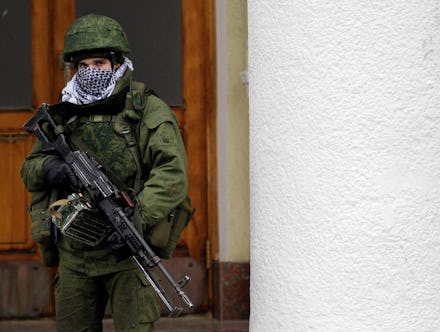Did Russia Just Invade Ukraine?

The news: In what Ukrainian officials are describing as an invasion and massive power-grab by the Kremlin, Russian forces appear to have flexed their muscle in the Crimea region of the Ukraine to strengthen Kremlin-allied forces against pro-Western protesters.
Image credit: New York Times
Hundreds of well-equipped, heavily-armed troops in camouflage and bearing no insignias have taken over civilian parts of the airport in Crimea's regional capitol of Simferopol, as well as deployed elsewhere throughout the region. Flights have continued to operate and as of yet no shots have been reported fired. A military airport near the Russian fleet at Sevastopol has also reportedly been occupied.
Russian Foreign Minister Sergei Lavrov insisted to Secretary of State John Kerry on Friday that no Russian forces have taken moves beyond securing their own military assets in the country, such as the Russian fleet. He might have been telling the truth — technically. According to The Daily Beast's Josh Rogin, the forces in control of the airport are not Russian military units but instead mercenaries working for the Russian private military company Vnevedomstvenaya Okhrana. Think of them as Russia's Blackwater, for-profit men of war willing to take themselves where the military can't, won't, or isn't capable of moving to.
"They don't have Russian military uniforms and the Russia government is denying they are part of the Russian military. Actually most of them may be Ukrainian citizens. But these are people that are legally allowed to perform services to the Russian fleet," Dimitri Simes of the Center for the National Interest told Rogin.
If the accounts are true, then the use of mercenaries rather than Russian military units would constitute a distinction without a difference. It would indicate that Russia is tired of waiting on the sidelines and sour after watching President Viktor Yanukovych lose control of the country, and has decided upon direct interference in Ukrainian affairs as their method of action.
The two nations have a long and intertwined history. Nikita Kruschev's Russia granted Crimea to the Ukraine in 1954. Currently, the region's ethnic composition is 50%+ Russian, while about a quarter are Ukrainian and just over 10% are Crimean Tartars, a mainly-Muslim populace terrorized and deported under Stalin's rule. Russia views their close relations with the Ukraine as both a matter of national pride and a crucial geopolitical asset. It has responded poorly, to say the least, to any indication that Ukraine wants to change the nature of their relationship.
Russian Foreign Ministry sources have not mentioned the occupation of the airport, but say that armored elements of the Black Sea Fleet have been deployed to protect their own positions. Simes argues that the troop deployments are a pretext for two separate objectives: First, to secure the airport against pro-Western protesters trying to prevent Crimean autonomy, and second to establish a secure foothold to which ousted Yanukovych can maintain he is still the democratically elected leader of the Ukraine. Moscow still views Yanukovych as leader of the country, able to authorize any Russian military deployments on Ukrainian soil.
By doing so, Russia can undermine the pro-Western movement in the western Ukraine and ensure that if Yanukovych can't bring Kiev back under control, he can still help establish a pro-Russian autonomous province in Crimea backed by Putin's military. However, Russia maintains a large fleet at Sevastopol and holds other military assets in the region.
Although the U.S. insists that by abdicating his duties and fleeing the country that Yanukovych has essentially terminated his leadership of the Ukraine, the former president was still insisting on his status as head of state on Friday from Russia.
"I intend to continue the fight for the future of Ukraine against those who, with fear and with terror, are attempting to replace the power," Yanukovych tellingly said in Russian — not Ukrainian.
"Nobody has overturned me. I was compelled to leave Ukraine due to a direct threat to my life and my nearest and dearest."
But Yanukovych seemed understandably stressed and in a weak position, perhaps realizing that the western Ukraine would never again accept him as a leader. And the acting Ukrainian leadership is furious, characterizing the occupation as an act of aggression.
Tensions throughout the Ukraine remain high, even between the pro-Western faction in control of Kiev. Ukrainian ultranationalists and neo-fascists have been at odds with the ruling authorities; in one incident documented on video, a fascist leader assaulted staff at a prosecutorial office.
Matthew Rojansky of the Wilson Center's Kennan Institute told Rogin that Putin was severely overplaying his hand.
"If it's true that Russian troops being directed by Moscow are crossing the line from simply securing existing Russian interests in Crimea to undermining Ukrainian sovereignty in Crimea, than Russia stands to lose from that because Russia’s influence in all of Ukraine will wane dramatically."